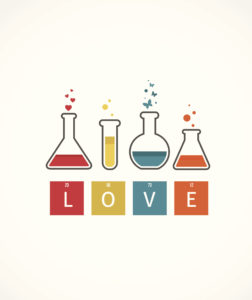
Valentine’s Day is a celebration associated with romance, but it is often fraught with anxiety. Why is that? Why is a day that celebrates love sometimes problematic? As a narrative couples therapist, I look to the discourses and stories in the culture that contribute to how things are thought about and defined. When it comes to the discourses about love, I could be unpacking these all day and not even scratch the surface!
The odd thing is that even though love is complicated, it is not nearly as complicated as we make it. The problem is that, culturally, we have taken the icing and made it the cake. What I mean by this is that we have decided that romance, a prominent feature of infatuation (what we call falling “in love”), is the lead actor in the play, rather than an important, but only supporting, character.
So how do we correct this particular troublesome narrative? We don’t want to get rid of the icing–I like icing! The value of deconstructing a discourse is in concluding that not all of it needs to go. The component parts can be examined and an evaluation made regarding their current value toward living a better life.
So that’s what I want to do in this essay–examine our current story about romance, its relationship to love, and sift through what is troublesome and what is not.
ROMANCE IS NOT LOVE: When I was a young man, I lived, like many others, for the thrill of romance. I looked around every corner for this feeling, knowing that an encounter with it would lift my day from the ordinary to the extraordinary. What I did not realize at the time was that I needed romance in order to feel good about myself–that without it I felt more or less flawed and unlovable.
This was not true of me, of course, any more than it is true for any other person, but this is one of the ways that romance has turned into a “drug” of sorts–making the trip down a difficult path so much easier. The problem is that romance doesn’t really move us down the path. It creates the illusion of movement, but eventually we wake up at the same starting point.
“Real love” is what gets us down the path of personal development, not romance. Romance is just one of the many doorways into real love. So why do we linger in the doorway instead of going all the way in? Well, because moving toward real love is not always fun–it can require hard work and a degree of vulnerability that feels unfamiliar. The main reason for the strong emphasis on romance in the narrative of love is because it feels so good.
But it is not love. Romance, clinically speaking, is more accurately described as bonding, an important and powerful part of the process of two people coming together, and it often leads to, and is strengthened by, sex. When we meet someone we are attracted to, our brains work overtime to build a connection with them because we are hard-wired to do so. As mammals, we thrive as social creatures who seek the company of others for safety and security, and pair-bonds are one way to not only achieve that, but also a way to build families. Romance is not the only draw toward this goal, but in modern times it has emerged as the dominant motivator.
(Watch “Your Brain Wants You To Have Sex. Here’s How That Works”)
REAL LOVE IS ABOUT THE PERSON, NOT AN IDEAL: Let’s talk more about real love, shall we? Why should we work hard to achieve it when romance is such a great “quick fix”? Well, as great as romance is, it does not and cannot last. Our bodies could not handle eternal infatuation, because when we are in it our brain is in somewhat of a psychotic state! The chemicals that are required to feel infatuation are not sustainable in the body, in the same way that we would rapidly break down physically if we were angry all the time–the chemical process is meant for short bursts, not long term!
Additionally, though romance is not love itself, it can be an effect of love. Without love, romance is about the person feeling it, not the person triggering it. Real love, by contrast, is about the person receiving it, and this is why it takes time to develop–we have to know about another’s inner emotional life before we can truly care about them. Real love grows out of empathy for another’s vulnerabilities–that is what connects us to them emotionally, not just physically. This ability to empathize also helps real love last over time, because it can override surface changes in a person that we might not like or agree with.
(Read “Marriage Isn’t For You”.)
Real love is a smooth calm feeling, not anxious or urgent. It is the feeling of caring for someone’s welfare and well-being–we feel sad when they are sad because there is an empathetic connection, not just sexual attraction. Real love takes time because it is sparked by vulnerability and pain–human elements, not ideals, that are not usually shown in the beginning of a dating experience (we only want to show our strengths!).
REAL LOVE CAN INCLUDE ROMANCE: There is a myth about long-term relationships that romance and sex “die” over time; the day-to-day familiarity of being around each other stamps out the mystery and excitement that are the basis of romantic feelings. While this certainly can happen, it is not a given! Familiarity can interfere with seeing your partner romantically or sexually, but we can choose actions that re-introduce mystery and excitement if that is important to us.
The problem is that most couples don’t know that it requires choosing these actions. We have been led to believe that “love is enough” and that romance should happen organically and spontaneously, and that if effort is required then it is not longer romantic. I push back against this way of thinking. I often tell couples that what they considered to be spontaneous romance during courtship was in fact the result of hours of preparation!
Anything worth maintaining requires some effort to do so, whether it is your physical fitness, your home, your career, or your friendships. The effort to maintain the things that are important to us is not always “fun”, but it is also not necessarily painful. It is just effort. Sometimes it is as simple as “setting the stage” for romance: dimming the lights, clearing the calendar, putting on soft music, making sure the kids are asleep. Sometimes it means doing little things for each other throughout the day, every day. If scheduling romantic or sexual time feels unnatural to you, then just schedule “time together” and see what happens once you set the stage. That is the organic part, and the preparation makes it possible for “spontaneous” romance to happen within a scheduled time period.
(Watch “The Secret To Desire In A Long-Term Relationship”, by Esther Perel)
When romance is a part of real love, it has a different quality to it than early infatuation. It is both more secure and more liberating, because there is trust established–something that is still forming in the beginning of a relationship. It can also be more playful and more erotic, because you know enough about each other’s boundaries and triggers that you can experiment with confidence. Most of all, it can feel joyful, more complete, and more creative, because it allows room for both or all partners compared to the individual self-focus of the infatuation stage.
***
Most of us love the excitement of romance–our bodies and brains feel like they are firing all cylinders. In today’s challenging world, who can blame someone for wanting that feeling? My goal in the work I do with individuals and couples is to make sure that the feeling of romance, or the desire to have it, does not end in malnourishment–that an understanding of how romance operates in the brain will open up a more mindful enjoyment of the experience, recognizing that it is the icing, not the cake.
It can be liberating to know that there are many different ways to “do” a long-term relationship, and that you can both take advantage of the science that is available concerning love, and allow yourself to make it up as you go along. There is much to be said for developing romance without the usual anxiety, so if that is something that you strive for in your relationship, learn what it is, and what it is not. Then go in the kitchen and bake your cake!

